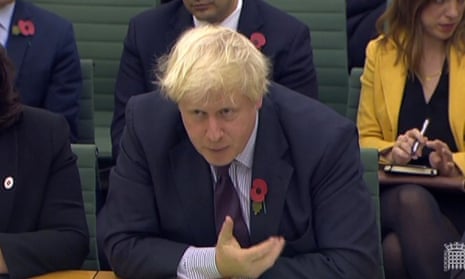Boris Johnson will travel to Washington next week in a bid to persuade US senators not to abandon the Iran nuclear deal or to impose fresh sanctions against Tehran that could jeopardise the deal.
While describing the deal as an “amazing triumph of diplomacy”, the foreign secretary acknowledged that it had not led to wider changes in Iranian policies in the Middle East, such as in its support for Hezbollah in Lebanon and Houthi rebels in Yemen.
Last month, Donald Trump threatened to terminate the 2015 deal unless Congress and US allies toughened the conditions on Iran – and to make restrictions on the country’s nuclear programme permanent.
Q&AWhy is Trump hostile to Iran?
Show
The genesis of Trump’s particular antipathy to Iran is hard to pin down. Before entering office he had been sceptical of Iran’s regional rival, Saudi Arabia. But during the 2016 election campaign all his closest foreign policy advisors, such as Michael Flynn, shared a worldview that portrays Iran as an uniquely malign actor in the Middle East and beyond. After the election, Israel, Saudi Arabia and the United Arab Emirates were successful in capturing the ear of Trump and his son-in-law and top adviser Jared Kushner.
Speaking to the foreign affairs committee, Johnson said Iran’s behaviour was creating an incredibly dangerous situation, but he said it was vital that America did not respond by “throwing the baby out with the bathwater” by rejecting the deal outright.
He said the 80 million Iranians “deserve and need to feel the benefits of both the deal and engagement”, adding that “the International Atomic Energy Authority has found the Iranians in compliance”. The country had a potentially extraordinary future, he said. But he added that perception “should not in any way blind us to the disruptive behaviour of Iran, or have any illusions about what they are up to”.
He said it might be possible to take measures to try to constrain Iran, but he did not want any measures to impact the nuclear deal so that it was “no longer viable from the Iranian point of view”. He added he was concerned that further sanctions might also damage the limited economic engagement already under way.
Insisting that the US-UK channel of communications remained vital, he went out of his way not to criticise Trump’s handling of issue, saying it was significant that he had only refused to recertify the agreement, handing that task to Congress to make a final decision within 60 days. “It was very clever piece of work. He kept the core of the [Iran nuclear deal] intact,” he said. “The fundamental trade-off on good behaviour on nuclear weapons and economic activity remains there, basically.”
He added that it was important that any fresh sanctions imposed on Iran went through agreed dispute resolution mechanisms, and were not imposed unilaterally.
Johnson acknowledged there were aspects of the deal that were going to need to be renegotiated, notably the sunset clause that ends the deal in eight years and could under some interpretation of the agreement allow Iran to possess a nuclear weapon almost as soon as the deal expires.
Johnson also condemned Iran’s detention of British citizen Nazanin Zaghari-Ratcliffe and even offered to visit her in prison. The foreign secretary has been criticised for refusing to condemn the jailing of the charity worker, who has been held since her arrest by Iran’s Revolutionary Guard in April 2016.
Johnson attacked Zaghari-Ratcliffe’s conviction for spying as a mockery of justice. “When I look at what Nazanin Zaghari-Ratcliffe was doing, she was simply teaching people journalism, as I understand it,” he said. “Neither Nazanin Zaghari-Ratcliffe nor her family has been informed about what crime she has actually committed. And that I find extraordinary, incredible.”
He said Iran resembled a Russian doll, with different states such as the Iranian Revolutionary Guards operating inside the state, but the task of the west was to encourage the democratic and civilian elements.
He also claimed that in Syria it might be possible to split Moscow from Tehran since Moscow was more eager for a peace deal that might involve western reconstruction money.
On his two-day visit to Washington, Johnson is likely to raise the US Treasury’s decision to put massive tariffs on Bombardier aircraft in Northern Ireland as part of a bid to defend its American rival, Boeing. He said the tariffs were neither fair nor reasonable.
He said: “No one in the UK should be under any illusion that the US will strike a very hard bargain on a future trade deal”, but that the UK would be in a position to start striking such new deals as soon as it left the EU in 2019, even if it remained in a transition period.
Prior to leaving the EU, the UK could scope or pencil in free trade deals with third parties, but could not put them in ink, he said. He also mentioned the possibility of the US returning to the Paris climate accord, saying the issue was not a lost cause.
